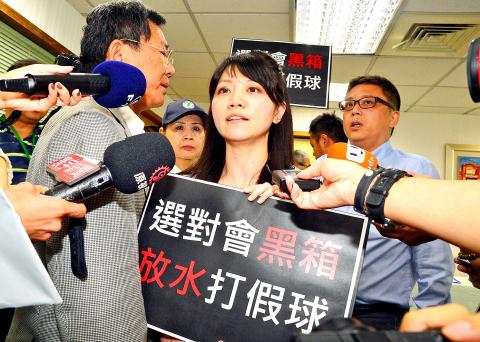Democratic Progressive Party (DPP) Taipei City Councilor Kao Chia-yu (高嘉瑜) yesterday staged a one-woman protest against the recent actions by the party’s Election Campaign Strategy Committee.
Holding a placard that accused the election committee of making opaque decisions on election nominations, Kao walked into the party’s Taipei headquarters right before its Central Executive Committee’s (CEC) weekly meeting was scheduled to begin.
“Chairperson, I am Kao Chia-yu, and I want to protest against the Election Campaign Strategy Committee’s non-transparent decision,” she shouted as DPP Chairperson Tsai Ing-wen (蔡英文) entered the meeting room.

Photo: Wang Yi-sung, Taipei Times
DPP Legislator Chen Ming-wen (陳明文), a CEC member, then blocked Kao from entering the room.
Kao told reporters that she had learned the election committee had been in touch People First Party Taipei City Councilor Vivian Huang (黃珊珊), and reached an agreement that the DPP would not nominate a candidate for the legislative seat representing Taipei’s Neihu (內湖) and Nangang (南港) districts in return for Huang cooperating with the DPP if Tsai win’s January’s presidential election.
Kao had previously said that she was willing to run for that seat.
DPP Deputy Secretary-General Hung Yao-fu (洪耀福) later told Kao that “if the party wants you to run, then you run; if it does not want you to run, then you do not run — unless you quit the party, and then we would not be able to tell you what to do.”
During its meeting, the CSC backed the election committee’s decision not to nominate candidates for 11 electoral districts in Taipei, New Taipei City, Taoyuan, Taichung and Hsinchu and Lienchiang counties, election committee convener Su Jia-chyuan (蘇嘉全) told a press conference.
Candidates from third political forces, including the New Power Party (NPP), Social Democratic Party and Green Party Taiwan would benefit from the DPP’s decision not to nominate candidates in some of those districts, while the DPP would throw its support behind independent former Hsinchu County commissioner Cheng Yung-chin (鄭永金), who is running for one of the county’s legislative seats, Su said.
Su also said that the election committee wanted to talk with DPP Taipei City Councilor Liang Wen-chieh (梁文傑) before it made any decision about Liang running for a legislative seat.
Liang earlier this month said he would not take part in the legislative elections after former DPP chairman Lin I-hsiung (林義雄) said that as a newly elected city councilor, Liang would be breaking political promises to voters if he ran for a legislative seat.
Heavy metal band Chthonic lead vocalist Freddy Lim (林昶佐), who is running for the legislative seat representing Taipei’s Zhongzheng (中正) and Wanhua (萬華) districts on the NPP ticket, welcomed the DPP’s decision not to nominate a candidate for that district.
“With such an atmosphere of solidarity, Taiwanese would have a greater opportunity of achieving the aim of overturning the Chinese Nationalist Party’s [KMT] long-term control of the legislature,” Lim said in a news release. “The decision is not a relief; rather, it is a greater responsibility for me. I will continue to visit and gain support from the more than 200,000 voters in Zhongzheng and Wanhua districts, for that I believe that the victory can only be won through solidarity.”
“Let us together make society a better place, and stand united to complete this historical democratic reform,” he said.

Alain Robert, known as the "French Spider-Man," praised Alex Honnold as exceptionally well-prepared after the US climber completed a free solo ascent of Taipei 101 yesterday. Robert said Honnold's ascent of the 508m-tall skyscraper in just more than one-and-a-half hours without using safety ropes or equipment was a remarkable achievement. "This is my life," he said in an interview conducted in French, adding that he liked the feeling of being "on the edge of danger." The 63-year-old Frenchman climbed Taipei 101 using ropes in December 2004, taking about four hours to reach the top. On a one-to-10 scale of difficulty, Robert said Taipei 101

Nipah virus infection is to be officially listed as a category 5 notifiable infectious disease in Taiwan in March, while clinical treatment guidelines are being formulated, the Centers for Disease Control (CDC) said yesterday. With Nipah infections being reported in other countries and considering its relatively high fatality rate, the centers on Jan. 16 announced that it would be listed as a notifiable infectious disease to bolster the nation’s systematic early warning system and increase public awareness, the CDC said. Bangladesh reported four fatal cases last year in separate districts, with three linked to raw date palm sap consumption, CDC Epidemic Intelligence

Two Taiwanese prosecutors were questioned by Chinese security personnel at their hotel during a trip to China’s Henan Province this month, the Mainland Affairs Council (MAC) said yesterday. The officers had personal information on the prosecutors, including “when they were assigned to their posts, their work locations and job titles,” MAC Deputy Minister and spokesman Liang Wen-chieh (梁文傑) said. On top of asking about their agencies and positions, the officers also questioned the prosecutors about the Cross-Strait Joint Crime-Fighting and Judicial Mutual Assistance Agreement, a pact that serves as the framework for Taiwan-China cooperation on combating crime and providing judicial assistance, Liang

US climber Alex Honnold left Taiwan this morning a day after completing a free-solo ascent of Taipei 101, a feat that drew cheers from onlookers and gained widespread international attention. Honnold yesterday scaled the 101-story skyscraper without a rope or safety harness. The climb — the highest urban free-solo ascent ever attempted — took just more than 90 minutes and was streamed live on Netflix. It was covered by major international news outlets including CNN, the New York Times, the Guardian and the Wall Street Journal. As Honnold prepared to leave Taiwan today, he attracted a crowd when he and his wife, Sanni,